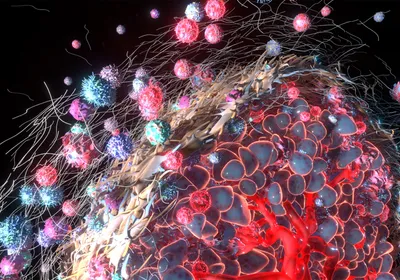ABOVE: Florin sniffs a urine sample.
NEIL POLLOCK, MEDICAL DETECTION DOGS
Electronic noses that detect cancers by their signature scents still can’t match the accuracy of a dog’s. That’s why Andreas Mershin and his team are looking to canines to teach machine learning algorithms to sniff out cancers. In a study published February 17 in PLOS ONE, the researchers integrate canine diagnoses of prostate cancer, sniffed out from urine samples, with machine odor analysis.
The researchers’ canine collaborators were Florin, a four-year-old female Labrador, and Midas, a seven-year-old female Wirehaired Vizsla, from Medical Detection Dogs in the UK. The dogs detected prostate cancer from urine samples with 70 percent accuracy. By combining the dogs’ decisions and chemical analysis of urine scents, the researchers trained artificial intelligence to make diagnoses with similar accuracy.
Read the full story.






















